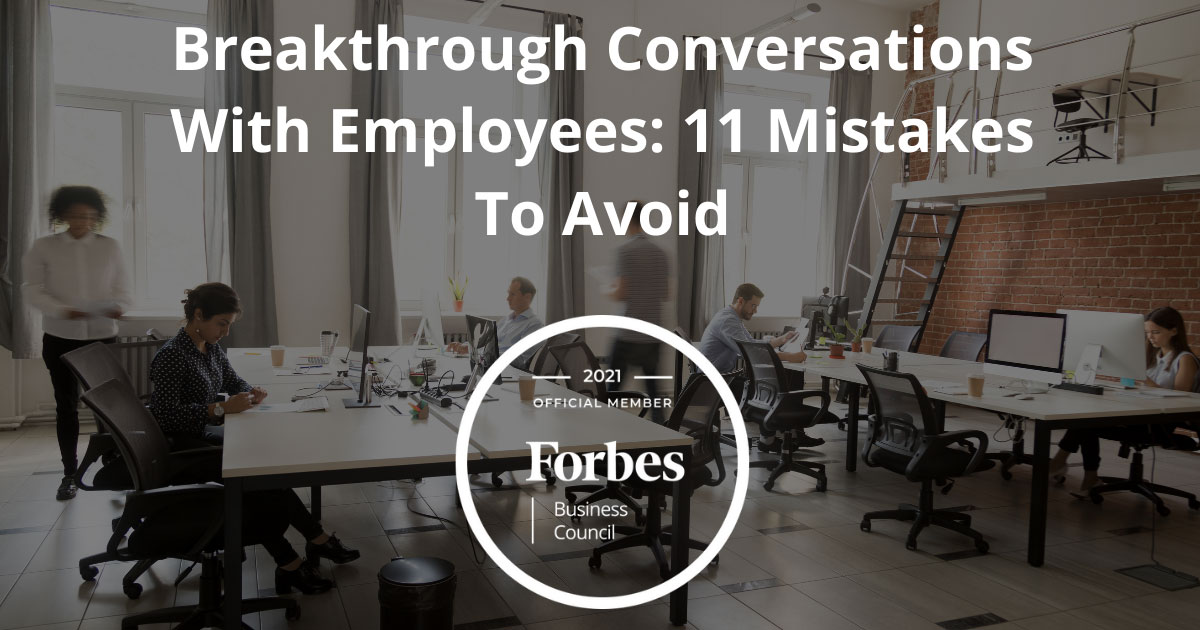Even though most leaders in business started somewhere at the bottom of the chain, it can be difficult to remember what it’s like to see the organization through the eyes of an employee. Understanding business operations from the employee’s perspective is a crucial element in ensuring that everything is running smoothly and that the business is poised to grow.
Breakthrough conversations are one of the best ways for leaders to gain insight into the operations of the business from the employee perspective. These conversations must happen naturally, which requires building an environment where employees feel comfortable enough to share their opinions. Below, members of Forbes Business Council discuss the biggest mistakes employers tend to make when attempting to have breakthrough conversations with their employees so that you can avoid making the same missteps.
1. Becoming Defensive
Being too dominant is where leaders often become defensive when criticized in public. The key is to listen in the situation and take a passive approach. Let them lead the discussion and make them feel comfortable voicing their opinions. Be clear that critiques are okay and you need this input. All these factors can help you in identifying problems that you couldn’t see previously. – Steve Suryadinata, Mata Investments
2. Not Building Trust
Trust is the foundation of authentic communication. Trust between leaders and employees is built through two parallel and equally important elements — consistent conversations geared toward open communication and active listening to what the employee is both saying and implying. Excessively responding to their insights can unintentionally come across as defensive. – Shannon Brooks, Shannon Brooks Consulting
3. Being Dishonest And Inauthentic
The one mistake I experienced when I was an employee was the lack of honesty and vulnerability from my former managers. In 2021, many of the old rules of professionalism are not working. Being authentic, vulnerable and honest is the only way forward. If you lead authentically and express your own feelings in a conversation, then you are humanizing your relationships and strengthening them. – Saana Azzam, MENA Speakers
4. Controlling the Conversation
Breakthrough conversations can make the difference between a group of competent individuals working toward a goal and a cohesive team innovating new solutions. Those conversations won’t happen unless participants feel safe expressing opinions and participating authentically. Avoid the mistake of trying to control the conversation and let it evolve naturally. – Ty Allen, SocialClimb
5. Not Being Fully Present
Creating an environment for breakthrough conversations requires one where they can happen regularly. These moments empower employees to be honest with their leaders. Mistakes include not actively making time for them, and when those moments come, not being present and actively listening. This two-way dialogue builds trust and helps a leader gain important insights about their business and culture. – Frank Vella, Constant Contact
6. Masking Or Sugarcoating Issues
The one mistake that leaders make when attempting to have breakthrough conversations with employees is sugarcoating or masking an issue that employees bring into the discussion. Actions speak louder than words. Open and safe dialogues evoke breakthroughs when leaders intentionally communicate they are listening, stay curious rather than judge and resist the urge to take over the conversation. – Loubna Noureddin, Mind Market Consultants
7. Giving Opinions In Personal Matters
Make sure not to get too involved with “adding your opinion” in regards to an employee’s personal life. It’s great to listen and have your employee feel like they are being heard, but there is a fine line you do not want to cross when dealing with personal drama. – Ian Bentley, Pivot and Scale
8. Forgetting Psychological Safety
The one mistake leaders make is forgetting about the importance of psychological safety within their organizations. When this does not exist, employees will feel afraid to speak up, share their views and ideas and truly show who they are at work without fear of judgment or negative consequences. When psychological safety is part of your company’s DNA, constructive conversation and flow emerge. – Andreea Vanacker, SPARKX5
9. Not Planning Beforehand
The most common mistake is failure to plan the conversation, preempt the response and prepare for the unexpected. For many leaders, it’s uncomfortable. They may stumble on insight—a blocked process, revealed wrongdoing or missed opportunity—but without a plan, dialogue is often reduced to a riddle. Emotional fallout, friction and frustration results. This is a highly undervalued skill. – Nuala Walsh, MindEquity
10. Dismissing Feedback
Leaders must ensure that every opinion is heard and responded to. To ensure there is a consistent approach in having important, honest conversations, employees must be allowed to speak freely and be heard. Leaders must not cut off employees and discard their feedback under any circumstance, no matter how ludicrous it may sound at first. An honest penalty-free forum must be promoted. – Shaz Memon, Digimax Dental
11. Being Aggressive And Impatient
When having a breakthrough conversation with your employees, it is important to maintain an open-minded, engaging and welcoming approach. Leaders are enthused to gain insight into breakthrough operations of a company, however, a common mistake is approaching the conversation in an aggressive or impatient manner. This will fail to foster a transparent and effective exchange of ideas. – Shabnam Safarzadeh, Advanced eClinical Training, LLC
This article was published on Forbes.com

